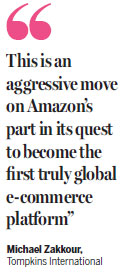Amazon moves in on rival Alibaba's big day
Updated: 2016-11-11 12:05
By Paul Welitzkin in New York(China Daily USA)
|
|||||||||
|
Jack Ma (right) applauds as a giant screen shows Alibaba's sales passing 10 billion yuan ($1.47 billion) within seven minutes of the start of China's Singles Day online sale on Nov 11. Shen Bohan / Xinhua |
As Alibaba's Singles Day shopping spree unfolded on Friday, the focus was on numbers: For consumers, it was the selling price. For analysts, it was how many orders did Alibaba process and what were the total sales.
And there was a major participant to watch: Amazon Inc, America's biggest e-commerce company and a rival to Alibaba Group Holding Ltd, and how it fares in what has become the Chinese version of "Black Friday" - the huge sales day after Thanksgiving in the US.
To jumpstart its business in the mainland, late last month Amazon launched its Prime membership program that targets Alibaba and other rivals like JD.com. According to iResearch, Amazon has less than 1.5 percent of the market, and to reach the market, it launched a store on Alibaba's Tmall last year.
The Prime program, which will cost about 188 yuan ($27.83) for the first year in a discounted introductory promotion, will offer Chinese consumers unlimited domestic shipping and free international shipping with a minimum purchase of 200 yuan. Alibaba and JD.com Inc offer free shipping but mainly for domestic transactions.

Michael Zakkour, vice-president of the China and Asia practice at global consultants Tompkins International, said the introduction of Prime is not just focused on competing with Alibaba, JD and others for market share.
"This is an aggressive move on Amazon's part in its quest to become the first truly global e-commerce platform. That is where the real competition between Alibaba and Amazon lies. They both want the global consumer. They both want 2 billion customers. Amazon wants to roll out Prime globally to provide the sell from anywhere-to-anywhere platform to achieve that goal," he said in an email.
Although both are the biggest e-commerce companies in China and the US respectively, the similarities pretty much end there as they have different business models. Amazon focuses on selling merchandise directly via an online marketplace. The Seattle-based company receives about three-quarters of its revenue from merchandise sales and the rest from providing digital content.
Hangzhou-based Alibaba acts as a middleman between online buyers and sellers and facilitates sales between the two parties through a network of websites.
Amazon has struggled in China and is looking to Prime to help it take market share from Alibaba and the others in the mainland.
"Alibaba via TMall and then JD.com essentially control consumer e-commerce traffic in China. Even if a consumer doesn't end up buying via one of those platforms, they still check them first so Amazon isn't the first online storefront that a consumer thinks of," noted Ben Cavender, senior analyst at the China Market Research Group in Shanghai in an email.
Pricing will be important for Amazon Prime in China, according to Nicole Peng, research director at Shanghai-based consultancy Canalys.
"Amazon's existing relationship with overseas sellers is a key for Amazon to provide the products at a competitive price," she said.
Cavender said Prime and Amazon's fate in China will come down to how successfully they are able to tie it to products that Chinese consumers are interested in buying.
"Amazon has an opportunity to offer a range of brands or products that Alibaba can't necessarily offer simply because of Amazon's global supply chain and strong product selection in the US, but it's going to have to work hard to figure out which of those brands and products are potentially valuable to Chinese consumers," he said.
paulwelitzkin@chinadailyusa.com
- Online shopping frenzy sparks trash concern
- Is it a thing? 10 odd jobs where you can make good money
- Message on a bottle: Mineral water company launches drive to find missing children
- Snow leopards caught on camera
- A foreigner's guide to Singles Day shopping spree
- China jails 49 for catastrophic Tianjin warehouse blasts
- Americans want to change presidential election system
- UK business calls for exclusive visa system for post-Brexit London
- Australia poised to sign refugee deal with United States: media
- Philippines' Duterte says he is against 2014 defense pact with US
- S.Africa wants to work with US in promoting peace: Zuma
- Trump's victory on global pages

 Alibaba breaks sales record on Singles Day
Alibaba breaks sales record on Singles Day
 Ten photos from around China: Nov 4-10
Ten photos from around China: Nov 4-10
 Snow storm hits Xinjiang
Snow storm hits Xinjiang
 Clinton concedes election, urges open mind on Trump
Clinton concedes election, urges open mind on Trump
 Places to enjoy golden gingko tree leaves
Places to enjoy golden gingko tree leaves
 Taobao village gets ready for shopping spree on 11/11
Taobao village gets ready for shopping spree on 11/11
 Overhead bridge rotated in East China's Shandong
Overhead bridge rotated in East China's Shandong
 The 75th anniversary of Red Square parade celebrated
The 75th anniversary of Red Square parade celebrated
Most Viewed
Editor's Picks

|

|

|

|

|

|
Today's Top News
No environmental shortcuts
US election rhetoric unlikely to foreshadow future US-China relations
'Zero Hunger Run' held in Rome
Trump outlines anti-terror plan, proposing extreme vetting for immigrants
Phelps puts spotlight on cupping
US launches airstrikes against IS targets in Libya's Sirte
Ministry slams US-Korean THAAD deployment
Two police officers shot at protest in Dallas
US Weekly

|

|










